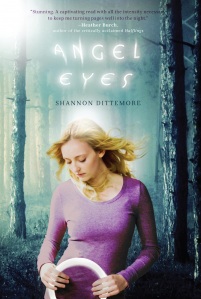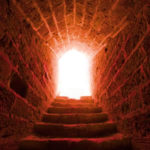The Bible And Speculative Fiction
Does the Bible belong in Christian speculative fiction? Of course there are various ideas behind what Christian fiction is and what it can and should accomplish, so much of the discussion about the Bible and its use in Christian speculative fiction will undoubtedly depend on a person’s philosophy about what a Christian can and should attempt to accomplish in fiction, and speculative fiction specifically.
Add the fact that speculative fiction is an umbrella category that covers a wide variety of genres. Here’s a look at some of the types and ways authors have used Scripture in their stories.
Biblical Fiction
Perhaps the category that can use Scripture most extensively is speculative fiction set in Biblical times. These stories borrow liberally from what the Bible says, but add from imagination what the Bible does not say. Similar to the alternative history approach of books such as Stephen Lawhead’s Bright Empires and Robert Treskillard’s retelling of Merlin’s story in his Merlin’s Spiral series, this type of fiction speculates on the times of Noah, such as Brian Godawa did in his Chronicles of the Nephilim Series, or follows the plight of Jonah or the Apostle Paul, and more.
Alternative Bibles
Some authors use a variation of Scripture, often creatively disguised by another name. For example, in her Restorer series, Sharon Hinck constructed an entire religion around knowledge and use of the Verses. A number were artful rephrasing of Scripture. As I recall, Donita Paul does something similar in her DragonKeeper Chronicles, and more recently Sally Apokedak uses Precepts which guide her protagonist in her award-winning young adult novel, The Button Girl.
Supernatural Suspense
Biblical Characters
 Perhaps the most common use of the Bible is the imaginative use of Biblical characters—demons, angels, the Nephilim. In fact, there are so many books in this category that the genre “Supernatural suspense” has come into being. Here are a few examples. Tosca Lee’s debut novel, which launched her fiction, was Demon: A Memoir. Karen Hancock wrote a science fiction-ish novel that incorporated the Nephilim. Shannon Dittemore wrote her Angel Eyes YA series, featuring very Biblical angels and demons. Kathryn Mackel wrote Hidden, an eerie story about chained fallen angels who break free.
Perhaps the most common use of the Bible is the imaginative use of Biblical characters—demons, angels, the Nephilim. In fact, there are so many books in this category that the genre “Supernatural suspense” has come into being. Here are a few examples. Tosca Lee’s debut novel, which launched her fiction, was Demon: A Memoir. Karen Hancock wrote a science fiction-ish novel that incorporated the Nephilim. Shannon Dittemore wrote her Angel Eyes YA series, featuring very Biblical angels and demons. Kathryn Mackel wrote Hidden, an eerie story about chained fallen angels who break free.
Biblical Places
Other supernatural stories are so bold as to delve into angelic realms or into the depths of hell. I’ve read some of these books, but titles elude me right now.
One that incorporates the suggestion of “Biblical places” is Tom Pawlick’s Christy Award winner, Vanish. Some titles in Bryan Davis’s Dragons in Our Midst series involve both going into and surviving hell.
Dystopians
David Gregory’s novel The Last Christian may not deal specifically with the Bible in his dystopian world in which a missionary returns home only to find that Christianity has died out, but Bryan Litfin’s Chiveis Trilogy makes the Bible the focus of his story in which Christianity is wiped out along with technology and the world as we know it. When the protagonist finds a portion of the Bible in a ruin, forces line up to suppress it or to bring it to light.
Stories with Biblical Themes
More often than not, stories that do not use the Bible in an overt way but do contain Biblical themes, are called Christian worldview stories. Any number of novels fall into this category—fantasies, science fiction, horror. I think of Patrick Carr’s Staff & Sword series and Jill Williamson’s stand alone science fiction, Replication.
Allegory
 I know of a few true allegories in the vein of Pilgrim’s Progress that have recently seen publication. One such is Walter Cantrell’s Disciple’s Quest series. In these books, the author puts Scripture in his own words from time to time, and also uses verses taken from the King James Version.
I know of a few true allegories in the vein of Pilgrim’s Progress that have recently seen publication. One such is Walter Cantrell’s Disciple’s Quest series. In these books, the author puts Scripture in his own words from time to time, and also uses verses taken from the King James Version.
Clearly the Bible can and does play an integral part in Christian speculative fiction. I don’t doubt that there are stories set in contemporary or future times, or even past, in which the Bible is simply the Bible. It hasn’t been lost or reworded. It isn’t waiting in the wings or the catalyst that initiated the story. Rather, somebody in the story believes it and reads it. I can’t think of a title that uses the Bible in this way, but I think it’s a legitimate way the Bible can appear in a story.
So often Christian speculative authors fear the accusation of “preachy” that they don’t want characters doing what actual Christians do—things like, praying and going to church and reading the Bible. But those activities are as real as a character doing drugs or sleeping around. There’s less hesitation, I’d suggest, to show characters who are immoral than ones who take the Bible seriously.
Sure, there are stories in other genres that show characters doing religious things, holding conservative views, but do they wrestle with the truths of Scripture? Do they show the characters going to the Bible for answers or comfort or guidance?
Nearly two years ago, Stephen Burnett wrote an article here at Speculative Faith about Christian fiction and the need to make it “more Christian,” not less. I wonder if including the Bible might not help to accomplish this.







































Often enough, the use of the Bible might seem preachy in speculative fiction because it is written in a way that’s out of place, which causes the reader to feel like it’s only in there to shove a message in their face. So, at the very least, calling the Bible something different helps when it is referenced in a fantasy/sci fi.
Thing is, fantasy worlds tend to have a different history than our world. An exact replica of the Bible tends not to fit well in most fantasy worlds simply because in that story’s universe, ancient Israel and all the cultural context within it didn’t exist. So, even if we want to add histories to our fantasy world that meet the basic events that caused Christianity, like the sacrifice of the Creator’s son, using an exact replica of the Bible still wouldn’t make sense since a lot of historical and cultural things discussed heavily in the Bible still wouldn’t be there.
A lot of times what I do in stories is reference that there is a section of ancient texts that are relied upon for spiritual matters, though it isn’t usually one consistent book that everyone following the Creator uses.
Or, in other story worlds of mine, there are little to no religious texts available. At that point, people are relying on a personal relationship with their Creator, dwelling on philosophical matters surrounding him, and taking into account old journals, etc. written by people that claimed to be close to him(Assuming it’s a story world where they have access to such things).
Another option is to have religious teachings, histories, etc. be completely oral. It wouldn’t be good for the characters to be preachy in the sense of constantly quoting stuff word for word, but if the traditions are oral then those that know that oral tradition will have religious concepts internalized very well in a lot of cases and will keep them in mind while making decisions. And, of course, there’s challenges like whether or not those passing on the oral traditions might be changing them to serve their own purposes.
I completely agree. That is part of the reason why we are writing the series we are writing. Our main protagonist is a committed Christian who reads his Bible daily(called “The Book of the Way” in our series as a reference to Acts where the believers followed “the Way”). We even wrote out a few passages from the Psalms as they were read when they served to enhance the plot. They pray several times, and even attend a couple church services. The amazing thing is that we have had several non-believers read this book, and they have really enjoyed it in spite of the Christianity within it. They see the faith of the characters as simply an extension of who those characters really are rather than something forced to make the book “Christian”.
I think Christians need to stop being afraid of putting our religion out there for the world to see. I recently reread the Belgariad, a classic and absolutely NOT Christian fantasy series by David Eddings, and I noted that his book was full of religion. In fact, the religions of his book were central to his plot, as misguided and foolish as they were. But his books were loved by his readers because of the stories and characters. If we focus on writing good stories that express the truth of God’s word, unblushing and unapologetically, we will not only strengthen the faith of our Christian readers, but we might just be able to reach people who do not know Jesus through our writings.
as a novice author in my retirement years I deeply appreciate the wisdom shared. I’m currently rewriting my book for a different publisher. It might well be a stew of the aforementioned formats. thank you for writing!
Tricia Mingerink in her fantasy series Blades of Acktar did use the word Bible – I found it refreshing and an excellent series